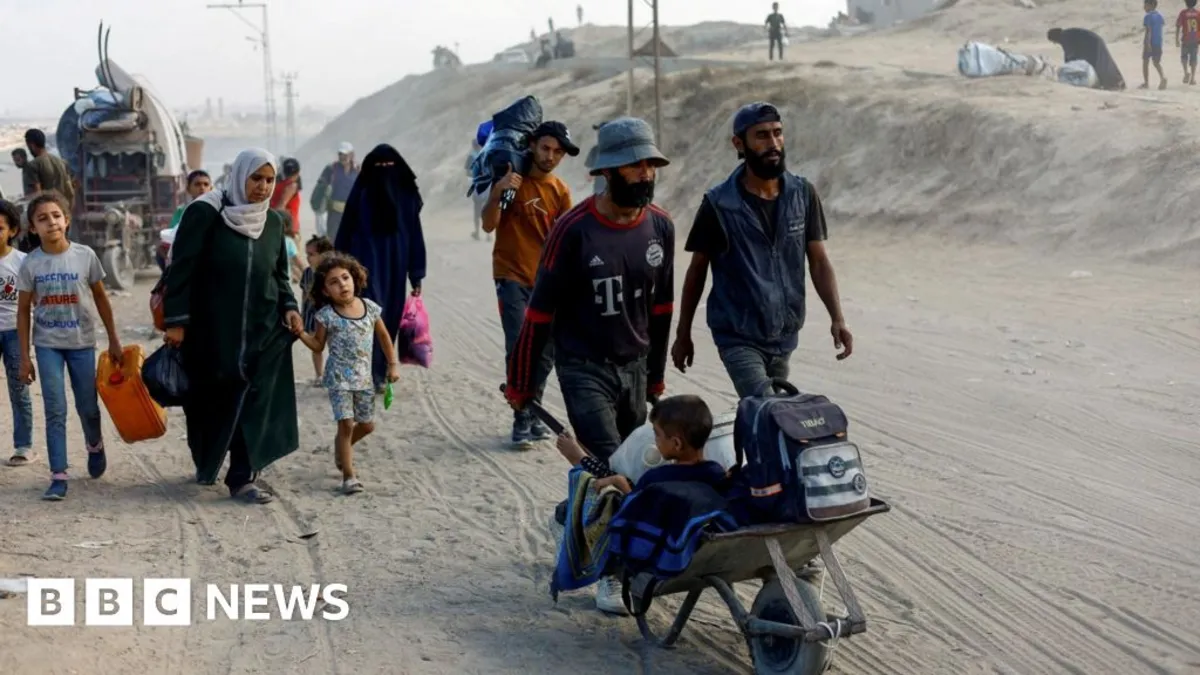
In a dramatic escalation of conflict, thousands of Palestinians are continuing to flee Gaza City as Israel's significant ground offensive enters its second day. The offensive, characterized by extensive bombardment, has left many residents in dire conditions. According to Gaza's Hamas-run health ministry, the al-Rantisi children's hospital was targeted in three separate attacks, prompting half of its patients and their families to evacuate. The Israeli military has stated it is currently investigating these reports.
In the wake of the attacks, hospitals across Gaza have reported at least 35 fatalities attributed to Israeli fire, with the majority of casualties occurring in the northern regions of the enclave. The Israeli military has disclosed that it has struck over 150 targets across Gaza City within the past two days, all in support of its ground forces. Israel claims its objective is to free hostages and eliminate approximately 3,000 Hamas fighters, whom it characterizes as operating from the group's last stronghold. However, this offensive has faced widespread international condemnation.
Leaders from more than 20 prominent aid organizations, including Save the Children and Oxfam, have condemned the humanitarian crisis unfolding in Gaza. They describe the situation as unconscionable, calling for immediate intervention as world leaders prepare for the upcoming UN General Assembly next week. Concerns are mounting about the conditions in Gaza, particularly at hospitals like al-Rantisi, which serves as a crucial specialist facility for children suffering from cancer and other severe medical conditions. Despite reports of no injuries at the hospital, essential infrastructure such as air conditioning units and water tanks has sustained significant damage.
As Israeli airstrikes intensify, large groups of Palestinians are fleeing southward, utilizing various means of transport including donkey carts, rickshaws, and overloaded vehicles. Many are moving towards a designated humanitarian area in al-Mawasi along the main coastal road. However, on Wednesday, the Israel Defense Forces (IDF) announced the temporary opening of a second route, the central Salah al-Din road, for 48 hours to facilitate movement.
Despite this announcement, many Palestinians report that the rising costs associated with displacement are prohibitive. Renting a small truck can cost as much as £660 ($900), while a tent for a family of five may reach around £880 ($1200). Lina al-Maghrebi, a mother of three from Sheikh Radwan, shared her struggles, stating, "I was forced to sell my jewellery to cover the cost of displacement and a tent," highlighting the financial burdens faced by those fleeing.
As the IDF reports that around 350,000 individuals have evacuated from Gaza City, the UN estimates around 190,000 have fled since August, with approximately 650,000 remaining in the city. Aid groups warn that the humanitarian area designated for these displaced individuals is already heavily overcrowded and ill-equipped to accommodate the influx of approximately two million people. Many who attempted to follow military evacuation orders found no space to pitch tents and chose to return north instead.
In the midst of these developments, the IDF has reportedly been utilizing modified military vehicles equipped with explosives, which are remotely controlled and driven to Hamas positions before detonation. This tactic has raised further concerns about civilian safety amidst the ongoing conflict.
The families of the 48 remaining hostages held by Hamas have expressed their outrage, staging protests near the residence of Israeli Prime Minister Benjamin Netanyahu. They argue that the ongoing military offensive jeopardizes the lives of their loved ones. One protestor, Macabit Mayer, poignantly questioned the morality of the destruction, asking, "Bringing down buildings in Gaza - who are you bringing these buildings down on?"
Pope Leo XIV has echoed these sentiments, describing the conditions for Palestinians in Gaza as unacceptable and reiterating his call for a ceasefire. He stated, "I am deeply close to the Palestinian people of Gaza, who continue to live in fear and under unacceptable conditions, forced yet again to leave their land."
Meanwhile, the European Commission has proposed sanctions against Israel in response to its actions during the ongoing conflict and its advancement of the E1 settlement project, which threatens to further divide the occupied West Bank. The proposal includes the suspension of certain trade arrangements under the EU's association agreement with Israel and sanctions against extremist Israeli ministers and violent settlers. Notably, these settlements are deemed illegal under international law.
Despite these proposals, Israel has warned the EU against imposing sanctions, asserting that there is currently insufficient support among member states for such measures. This development follows a United Nations Commission of Inquiry's conclusion that Israel has committed acts of genocide against Palestinians in Gaza, including targeted violence against children and systematic attacks on cultural and educational sites.
Israel's foreign ministry has categorically rejected the UN report, labeling it as distorted and false. This ongoing conflict erupted following a Hamas-led attack on southern Israel on October 7, 2023, which resulted in the deaths of approximately 1,200 individuals and the abduction of 251 others. Since the onset of Israel's military campaign, Gaza's health ministry reports that at least 64,964 people have been killed, nearly half of whom are women and children. As humanitarian conditions deteriorate, the UN warns that further escalation of the offensive could plunge civilians into a deeper catastrophe.